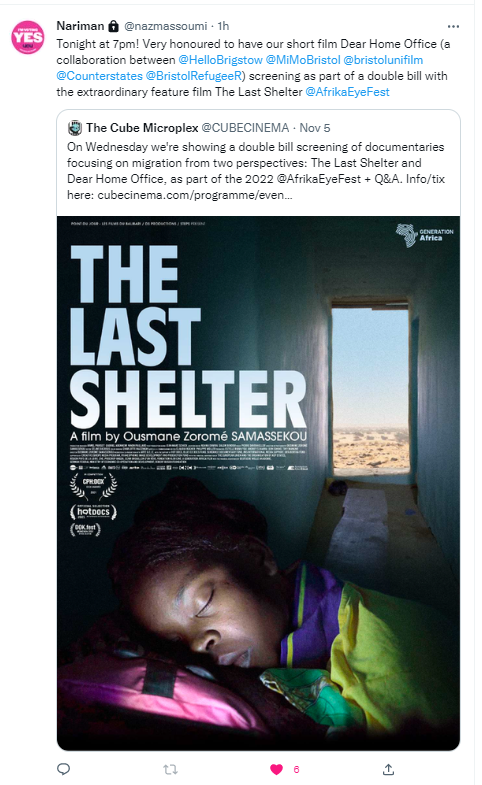Scrutinising the Immigration System Through Collaborative Filmmaking with Refugees and Asylum Seekers
Can a collaborative filmmaking process provide an empowering space for refugees and asylum seekers? Can filmmaking be used as a critical tool in examining the current immigration system? This research seeks to scrutinise the immigration system through collaborative filmmaking.

Media representations of refugees and asylum seekers have played a damaging role in shaping public attitudes and perceptions of migration. Films frequently stumble into a range of problematic depictions, patronising subjects, sensationalising issues and reinforcing negative tropes, focusing scrutiny on refugees rather than the institutional mechanisms responsible for their harmful experiences.
What did the project involve?
This project sought to incorporate refugee voices through a collaborative forum that enables refugees to scrutinise the system. It sought to create a space where refugees can have agency over the labyrinthine system they must navigate. It resulted in a critical filmic representation of the institutional structures and actors involved in creating and sustaining the immigration system that negatively impacts their lives and will explore questions around the effective visual portrayal of these processes and how collaborative filmmaking can provide an educational and empowering space for refugees and asylum seekers.
Utilising the empowering and critical potential of filmmaking, this research team produced a film on the UK immigration system. The ideas for this emerged from valuable conversations in workshops and development meetings. Through the ideation and production of this film, participants grappled with representational or aesthetic strategies in portraying the immigration system, asking questions such as: should the focus lie on the institutions, social actors and/or spaces in which the border policies are maintained?
The workshops and processes were recorded, and a blog hosted on the Migration and Mobilities Institute website included posts and images from the project team reflecting on key stages, discoveries and challenges of the project as it develops.
Who are the team and what do they bring?
- Nariman Massoumi (Film and Television) is a practice-as-research filmmaker focused on family documentary, autoethnography and displacement. He is the coordinator of the research strand ‘Imagination, Belonging, Futures’ of Migration Mobilities Bristol.
- Alice Cutler (Bristol Refugee Rights) will work closely on the project’s co-design and implementation. This will enable the team to ensure that the process and outcomes are of benefit to asylum seekers.
- Bridget Anderson’s (Sociology, Politics and International Studies, and Migration Mobilities Institute) work explores the tension between the labour market and citizen rights and looks to understand the functions of immigration in key labour market sectors. Bridget has worked closely with migrant organisations, trade unions and legal practitioners.
- Katie Bales (Law) is a member of the Sanctuary Scholarships working group and a trustee of the Bristol City of Sanctuary. Katie’s research takes a critical approach to the reception conditions for forced migrants in the UK, particularly in relation to welfare, work and access to higher education.
- Irene Elizabeth
What were the results?
The Brigstow “Creativity and Policy. Work in Progress” video below gives a glimpse into Subject to Scrutiny’s research process. Hear the team discuss different approaches to explore immigration policies from the perspectives of those directly affected along side experimental partnership Kept Apart: Making prose poetry with people separated from families by the immigration system.
The project received further Brigstow funding for the post production costs and the final outcome was the creation and screening of the film Dear Home Office. It was aired at the Watershed cinema alongside a Q+A with the following press release:
“Dear Home Office is a short film produced as part of Subject to Scrutiny, a collaborative project between Migration Mobilities Institute, University of Bristol and Bristol Refugee Rights. Structured in the form of a letter, the film combines views and experiences of the asylum system expressed by asylum seekers and refugees who participated in the project.
The film was produced through a series of workshops and conversations with asylum seekers and refugees during the first lockdown in 2020. These conversations were developed into a script in the form of a letter that were then visualised drawing inspiration from discussions and ideas emerging from the workshops.
The original aim of the research project was to find ways of moving beyond a familiar mode of representing asylum seekers that relies heavily on intrusive and traumatic experiences of forced migration and personal suffering, and instead to use filmmaking as a critical tool to scrutinise the UK asylum system itself.
This event will begin with a screening of Dear Home Office followed by a discussion with the filmmakers, project team and participants on the process that led to the final outcome reflecting back on the original objectives, the complex challenges of collaborative filmmaking with asylum seekers and refugees during a pandemic and the role of filmmaking in responding to restrictive migration and border policies.
Supported by Brigstow Institute.”
Following its premiere it was screened at other cinemas such as The Cube Microplex.


